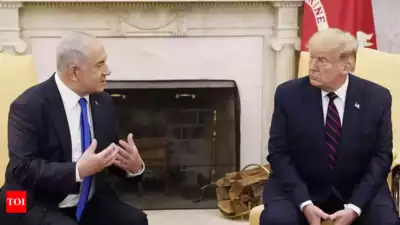By Kumail Mehdi
November 6, 2024, 3:14 PM GMT+5
The announcement of Donald Trump’s projected victory in the 2024 U.S. presidential election has sparked widespread celebration within Israel’s right-leaning government and its support base. Prime Minister Benjamin Netanyahu led the chorus of praise, declaring Trump’s apparent return to the White House as “history’s greatest comeback.” This development is viewed as a significant boost for Netanyahu’s administration, which has faced friction with President Joe Biden’s Democratic leadership.
A ‘New Beginning’ for U.S.-Israel Relations
Netanyahu highlighted the potential for renewed ties between Israel and the U.S., expressing optimism over a revitalized partnership. “Your historic return to the White House offers a new beginning for America and a powerful recommitment to the great alliance between Israel and America,” Netanyahu stated. His sentiments were echoed by prominent figures within his hard-right coalition, who anticipate stronger U.S. support under Trump’s leadership.
During Trump’s first term, Israel secured notable diplomatic victories, including the U.S. recognition of Jerusalem as Israel’s capital and sovereignty over the Golan Heights. These moves defied global consensus but were heralded as monumental by Israeli leadership.
Reactions from Settler Leaders and Palestinian Groups
Israel’s settler leaders, including Israel Ganz, chairman of the Yesha Council, expressed confidence in Trump’s unwavering support. “We expect to have an ally standing unconditionally beside us as we fight the battles that are a war on the entire West,” Ganz stated, underscoring the strategic importance of the alliance for Israel’s contentious settlement policies.
Conversely, Palestinian militant group Hamas, engaged in ongoing conflict with Israel in Gaza, responded with a call for a shift in U.S. policy. “We urge Trump to learn from Biden’s mistakes,” stated Sami Abu Zuhri, a Hamas official, while urging an end to “blind support” for Israel. The conflict in Gaza, marked by devastating losses and global protests, has placed significant strain on Israel’s international standing under Netanyahu’s government.
Domestic Sentiment and Strategic Concerns
Israeli public opinion appears to lean heavily in favor of Trump, with a survey conducted by the Israel Democracy Institute indicating that nearly two-thirds of Israelis believe Trump would better serve their national interests compared to Vice President Kamala Harris. Jerusalem resident Nissim Attias voiced this perspective, remarking, “I think it’s good for Israel. He proved the last time he was the president, he moved the embassy from Tel Aviv to Jerusalem and everything that he said, he did.”
Despite the optimism, challenges remain. As Trump’s victory celebrations unfolded, tensions flared anew when approximately 10 rockets were fired from Lebanon into Israeli territory, including Tel Aviv, which fortunately resulted in no injuries. Israel’s air defense systems intercepted some of the missiles, although one struck a vehicle in Raanana, illustrating the ongoing volatility in the region.
The Path Ahead
The Israeli government and its allies view Trump’s return as a strategic advantage for advancing their political and military objectives. Whether this period will indeed mark a “golden age” for Israeli-U.S. relations remains contingent on how Trump’s policies align with shifting geopolitical and domestic realities. The coming months will be pivotal in defining how this renewed partnership shapes the Middle East’s complex landscape.




